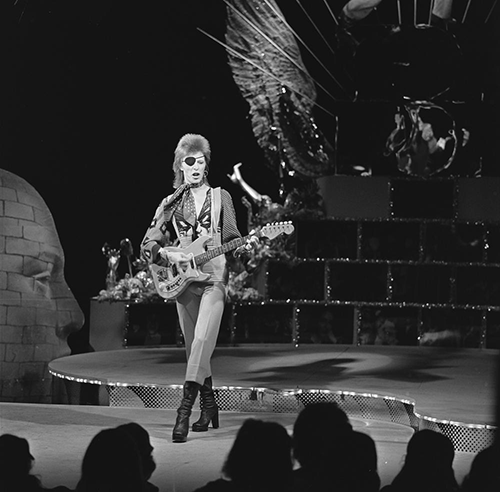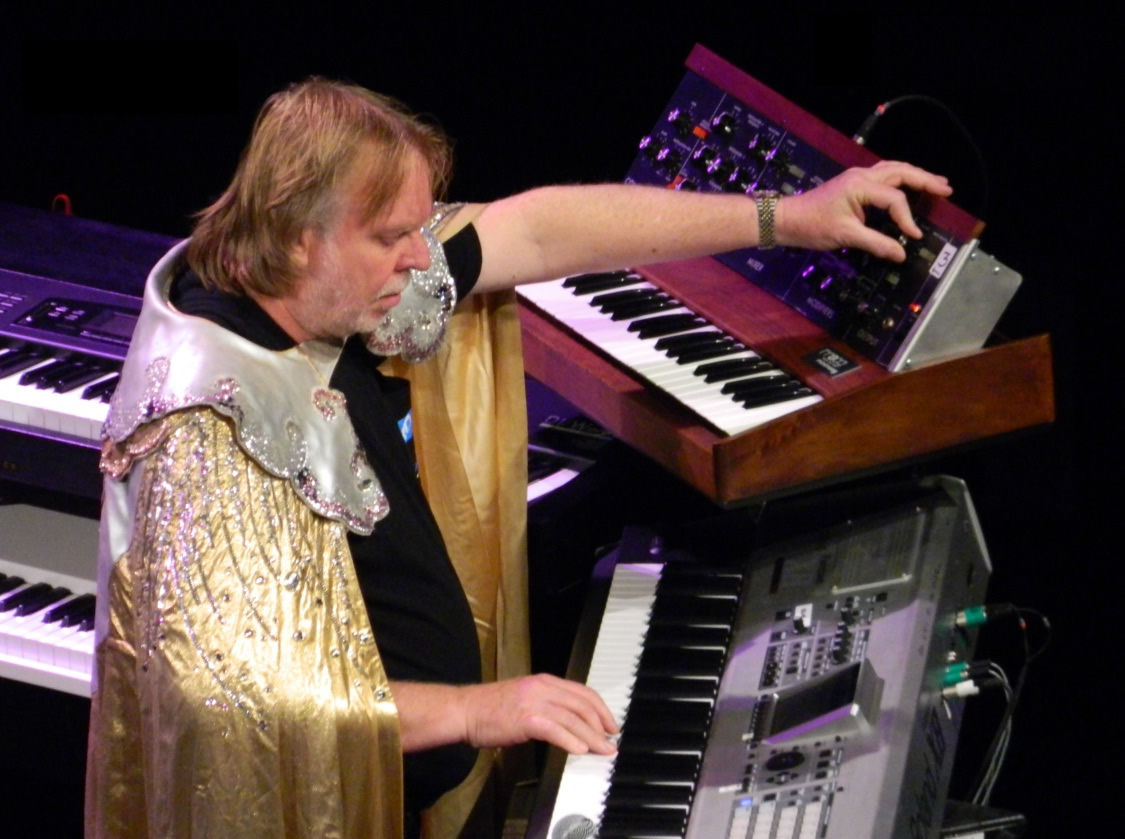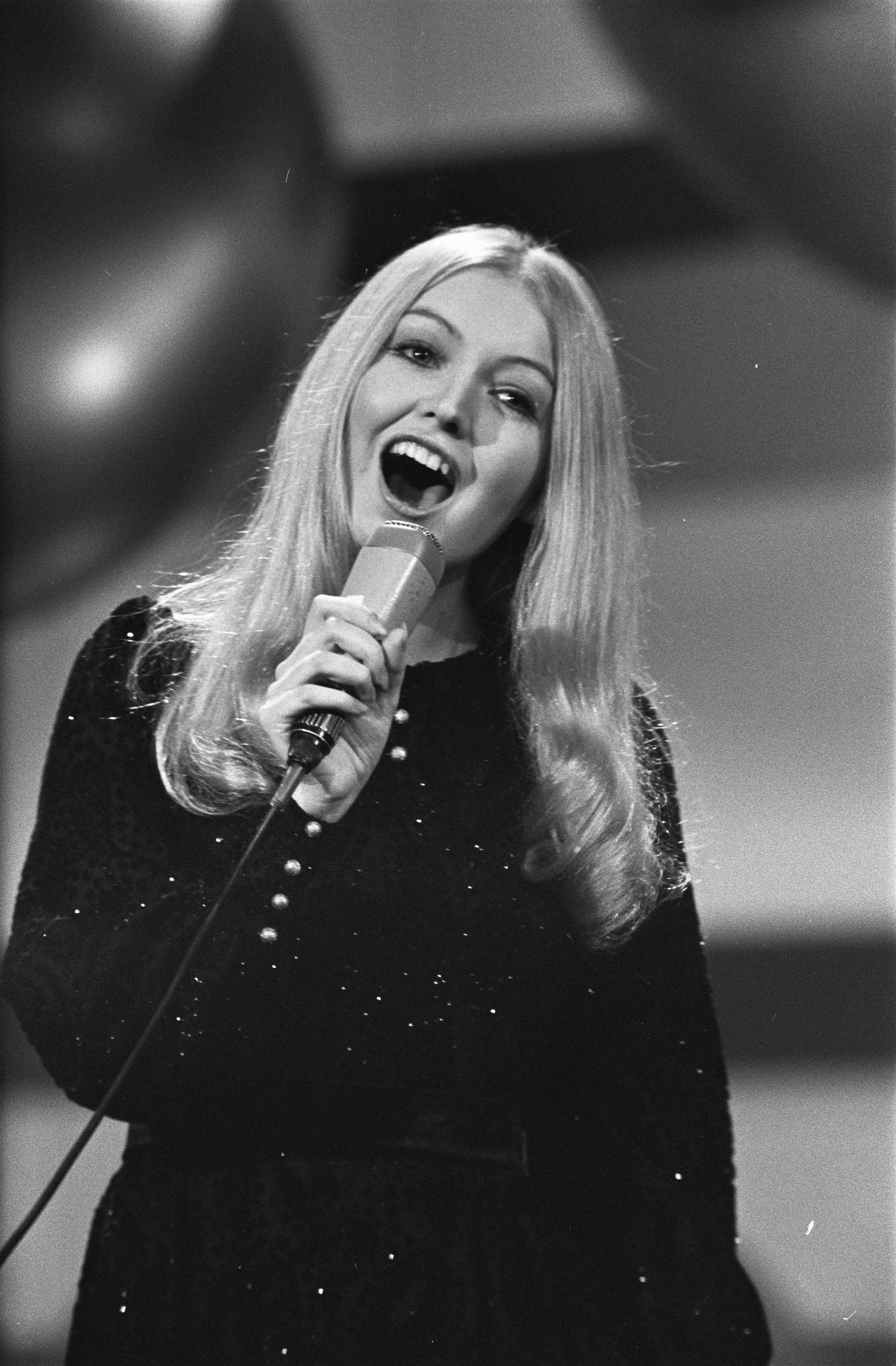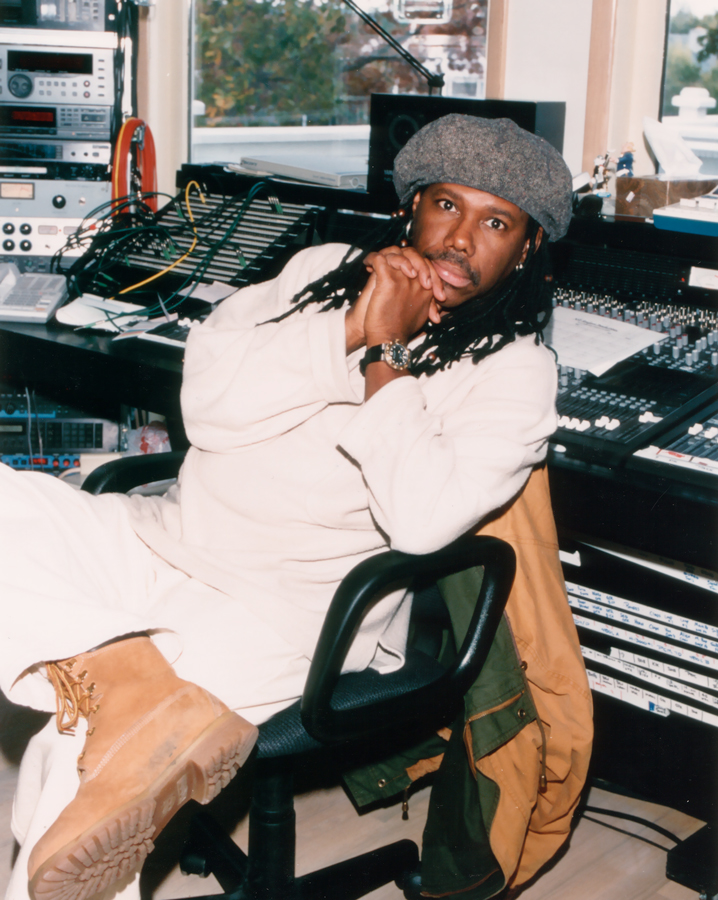|
Bowie (Flight Of The Conchords)
"Bowie" is the sixth episode of the HBO comedy series ''Flight of the Conchords''. The episode first aired in the United States on Sunday, 22 July 2007. After a photo session, Bret develops body image issues and gets some dream advice from his idol, David Bowie. Jemaine plots to cheer him up and Murray tries to get one of the band's tunes used for a musical greeting card. Plot Bret starts suffering body image issues after Murray accuses him of being small during a photo session. He then gets visited in a dream by a Ziggy Stardust-era David Bowie (performed by Jemaine, whose resemblance is acknowledged by Bret) telling him not to worry about his body image and advising him to get an eyepatch. Murray announces that he has arranged a meeting with a company who are interested in using one of the band's songs in a musical greeting card. Jemaine visits Mel and asks her to cheer Bret up complimenting him next time she sees him. Later Jemaine tries to cheer Bret up himself by singi ... [...More Info...] [...Related Items...] OR: [Wikipedia] [Google] [Baidu] |
Flight Of The Conchords (TV Series)
''Flight of the Conchords'' is an American sitcom that was first shown on HBO on June 17, 2007. The show follows the adventures of Flight of the Conchords, a two-man band from New Zealand, as its members seek fame and success in New York City. The show stars the real-life duo of Jemaine Clement and Bret McKenzie, who play fictionalized versions of themselves. A second season was announced on August 17, 2007, and shown from January 18, 2009. On December 11, 2009, HBO canceled the series after two seasons and the duo announced that the series is not going to be returning for a third season. Throughout its run, ''Flight of the Conchords'' received positive critical reception, with its second season scoring 80/100 on Metacritic. The show received 10 Emmy Award nominations, including "Outstanding Comedy Series" and "Outstanding Lead Actor in a Comedy Series" for Jemaine Clement, both in 2009. Plot The series centers on the day-to-day lives and loves of two shepherds-turned-musicians, ... [...More Info...] [...Related Items...] OR: [Wikipedia] [Google] [Baidu] |
Flight Of The Conchords (album)
''Flight of the Conchords'' is the debut full-length studio recorded album by New Zealand folk parody duo Flight of the Conchords, released 21 April 2008 by Sub Pop. Two songs, "Business Time" and "The Most Beautiful Girl (In the Room)", have been released as downloadable content for the video game ''Rock Band''. Track listing Personnel *All songs written and performed by Jemaine Clement and Bret McKenzie *Sara Johnston - vocals on "Foux du Fafa" *Robin Lynn - keys on "Foux du Fafa," "Think About It" and "The Most Beautiful Girl (In the Room)" *Gus Seyffert - bass on "Think About It" and "Business Time" *Danny Frankel - percussion on "Think About It," "The Prince of Parties" and "Business Time" *Mickey Petralia - drums on "Ladies of the World" and "Leggy Blonde;" percussion on "The Prince of Parties" and "A Kiss is Not a Contract" *Mark Lewis - drums on "Ladies of the World" and "The Most Beautiful Girl (In the Room)" *Kyle O'Callaghan - co-writer and guitar on "The Most Beauti ... [...More Info...] [...Related Items...] OR: [Wikipedia] [Google] [Baidu] |
Mime
Multipurpose Internet Mail Extensions (MIME) is an Internet standard that extends the format of email messages to support text in character sets other than ASCII, as well as attachments of audio, video, images, and application programs. Message bodies may consist of multiple parts, and header information may be specified in non-ASCII character sets. Email messages with MIME formatting are typically transmitted with standard protocols, such as the Simple Mail Transfer Protocol (SMTP), the Post Office Protocol (POP), and the Internet Message Access Protocol (IMAP). The MIME standard is specified in a series of requests for comments: , , , , and . The integration with SMTP email is specified in and . Although the MIME formalism was designed mainly for SMTP, its content types are also important in other communication protocols. In the HyperText Transfer Protocol (HTTP) for the World Wide Web, servers insert a MIME header field at the beginning of any Web transmission. Clients ... [...More Info...] [...Related Items...] OR: [Wikipedia] [Google] [Baidu] |
Rebel Rebel
"Rebel Rebel" is a song by English singer-songwriter David Bowie. It was released in the UK in February 1974 by RCA Records as the lead single from the album ''Diamond Dogs''. Written and produced by Bowie, the song is based around a distinctive guitar riff reminiscent of the Rolling Stones. Cited as his most-covered track, "Rebel Rebel" has been described as Bowie's farewell to the glam rock movement that he had helped initiate, as well as being a proto-punk track. Two versions of the song were recorded: the well-known UK single release and the shorter US single release, which featured added background vocals, extra percussion and a new arrangement. Upon its release, the song was a commercial success, peaking at number five on the UK Singles Chart and number 64 on the US ''Billboard'' Hot 100. The song received critical acclaim for its central guitar riff and strength as a glam anthem. Several publications consider it to be one of Bowie's greatest songs. It was performed live ... [...More Info...] [...Related Items...] OR: [Wikipedia] [Google] [Baidu] |
TopPop
''TopPop'' is the first regular dedicated pop music television series in the Dutch language area. The Netherlands broadcaster AVRO aired the programme weekly, from 22 September 1970, to 27 June 1988. Presenter Ad Visser hosted for its first fifteen years. The creator and original director of ''TopPop'' was Rien van Wijk. Many other directors followed: Egbert van Hees, Geert Popma, Henk Renou, Chris Berger, Jessy Winkelman, Wim van der Linden, Bert van der Veer and Charly Noise. Although ''TopPop'' was inspired by British music programme ''Top of the Pops'', it had its own character. Description The main approach was to let music artists Lip sync, mime to their latest hit record in the ''TopPop'' studio. However, most music acts in the Netherlands, Dutch pop charts were foreign to the Netherlands, and frequently not available for a performance in the studio. If this was the case, it was sometimes possible for the ''TopPop'' camera crew to meet the artist at another location. Cons ... [...More Info...] [...Related Items...] OR: [Wikipedia] [Google] [Baidu] |
AVRO
AVRO, short for Algemene Vereniging Radio Omroep ("General Association of Radio Broadcasting"), was a Dutch public broadcasting association operating within the framework of the Nederlandse Publieke Omroep system. It was the first public broadcaster in the Netherlands. In 2014 AVRO merged with fellow broadcaster TROS to form AVROTROS. History On 8 July 1923, Hilversumsche Draadlooze Omroep was launched by the Nederlandsche Seintoestellen Fabriek (in English: Dutch Transmitter Factory) under supervision of Willem Vogt. On 21 July 1923, it provided the very first regular radio broadcast in the Netherlands. In 1927 it changed its name into Algemeene Nederlandsche Radio Omroep (ANRO), followed soon by a merger with Nederlandsche Omroep Vereeniging (NOV). On 28 December 1927, the two merged broadcasters continued as Algemeene Vereeniging Radio Omroep (A.V.R.O., in English: "General Association of Radio Broadcasting"). In 1938, AVRO sponsored what was the strongest chess tournamen ... [...More Info...] [...Related Items...] OR: [Wikipedia] [Google] [Baidu] |
Love You Till Tuesday (film)
''Love You till Tuesday'' is a promotional film designed to showcase the talents of a 22-year old David Bowie, made in 1969. The film was an attempt by Bowie's manager, Kenneth Pitt, to bring Bowie to a wider audience. Pitt had undertaken the film after a suggestion by GĂĽnther Schneider, producer of German TV show ''4-3-2-1 Musik FĂĽr Junge Leute'' for the ZDF network. The film ended up being shelved, and was not released until 1984, when it finally came out on VHS. A DVD version was released in UK in 2005. Production Pitt hired his friend Malcolm J Thomson to direct the half-hour film, which was originally planned to showcase seven of Bowie's songs, including four from his 1967 David Bowie (1967 album), debut album (three of them newly re-recorded for the film), plus the follow-up single "Let Me Sleep Beside You" and new compositions "When I'm Five" and "Ching-a-Ling". It would also include a mime artist, mime piece performed and narrated by Bowie, ''The Mask''. Before shooti ... [...More Info...] [...Related Items...] OR: [Wikipedia] [Google] [Baidu] |
Life On Mars?
"Life on Mars?" is a song by English singer-songwriter David Bowie, first released on his 1971 album ''Hunky Dory''. In 1968, Bowie was commissioned to write English lyrics for the Claude François French song " Comme d'habitude". After his lyrics were rejected, songwriter Paul Anka rewrote it into "My Way", made famous by singer Frank Sinatra in 1969. Annoyed at the success of "My Way", Bowie used the song as a template and wrote "Life on Mars?" as a parody of Sinatra's recording. It was written primarily on piano and recorded on 6 August 1971, the final day of the ''Hunky Dory'' sessions. Co-produced by Bowie and Ken Scott, the backing band consisted of guitarist Mick Ronson, bassist Trevor Bolder and drummer Mick Woodmansey; Ronson also composed the song's string arrangement. Piano was played by Strawbs member Rick Wakeman. Musically, "Life on Mars?" is described as a "soaring, cinematic ballad". Primarily glam rock, with elements of cabaret and art rock, the song ... [...More Info...] [...Related Items...] OR: [Wikipedia] [Google] [Baidu] |
Changes (David Bowie Song)
"Changes" is a song by English singer-songwriter David Bowie, originally released on his 1971 album ''Hunky Dory''. RCA Records then released it as a single from the album on 7 January 1972. Written following his promotional tour of America in early 1971, "Changes" was recorded at Trident Studios in London between June and July that year. Co-produced by Bowie and Ken Scott, it featured Strawbs member Rick Wakeman on piano and the musicians who would later become known as the Spiders from Mars: guitarist Mick Ronson, bassist Trevor Bolder and drummer Mick Woodmansey. The song also marks the first instance of Bowie playing the saxophone on one of his recordings. At this point in his career, Bowie had experimented with numerous musical styles, all of which failed to earn him stardom. The lyrics of "Changes" reflect this, with the first verse focusing on the compulsive nature of artistic reinvention and distancing oneself from the rock mainstream. The second verse concerns clashes ... [...More Info...] [...Related Items...] OR: [Wikipedia] [Google] [Baidu] |
Sound And Vision
"Sound and Vision" is a song by English musician David Bowie. It was released in January 1977 by RCA Records on side one of his 11th studio album '' Low''. RCA later chose it as the first single from the album. Co-produced by Bowie and Tony Visconti, the song was recorded at the Château d'Hérouville in Hérouville, France, in September 1976, and completed at Hansa Studios in West Berlin in October and November. The song began as a simple G major chord progression that Bowie gave to the backing musicians, writing and recording his vocals afterward. It features backing vocals from Brian Eno and Visconti's then-wife Mary Hopkin. Regarded by biographers as the closest to a "conventional pop song" on ''Low'', "Sound and Vision" is oddly structured. Beginning as an instrumental, elements are added throughout the song's runtime; Bowie's vocals do not appear for over a minute and a half. The song's lyrics are dark and introspective, reflecting Bowie's mental state after years of d ... [...More Info...] [...Related Items...] OR: [Wikipedia] [Google] [Baidu] |
Let's Dance (David Bowie Song)
"Let's Dance" is a song by English singer-songwriter David Bowie, originally included as the title track of his 1983 album of the same name. Co-produced by Nile Rodgers of Chic, it was recorded in late 1982 at the Power Station in New York City. With the assistance of engineer Bob Clearmountain, Rodgers transformed the song from its folk origins to a dance number through studio effects and new musicians Bowie had yet to work with. Bowie hired then-unknown Texas guitarist Stevie Ray Vaughan, who added a blues-edge. Embracing rock, funk, dance, new wave and post-disco, the full-length seven-minute track features numerous solos, including trumpet, saxophone, guitar and percussion. Several music elements, from the bassline and the breakdown, were based on Rodgers' work with Chic, while the rising vocal intros were taken from the Beatles' version of "Twist and Shout". The lyrics describe a couple dancing under the moonlight and possess a sense of peril and ominousness. Released a ... [...More Info...] [...Related Items...] OR: [Wikipedia] [Google] [Baidu] |
John, I'm Only Dancing
"John, I'm Only Dancing" is a song by English musician David Bowie, originally released as a non-album single on 1 September 1972. A glam rock and R&B number, the lyrics describe a situation in which the narrator informs his lover not to worry about the girl he is with because he is "only dancing" with her. Although ambiguous, many interpreted it as concerning a gay relationship. Recorded in London in June 1972, it was boasted by a low-budget promotional video directed by Mick Rock. It reached number 12 in the UK; RCA refused to release it in America due to its suggestive lyrical content. After its release, Bowie rerecorded the song twice, including for possible inclusion on ''Aladdin Sane'' (1973). RCA issued this version, featuring a new arrangement with saxophone, as a single in April 1973 with the exact same catalogue number and B-side as the original. Both versions have since appeared on numerous compilation albums, including ''Re:Call 1'', part of ''Five Years (1969â ... [...More Info...] [...Related Items...] OR: [Wikipedia] [Google] [Baidu] |






